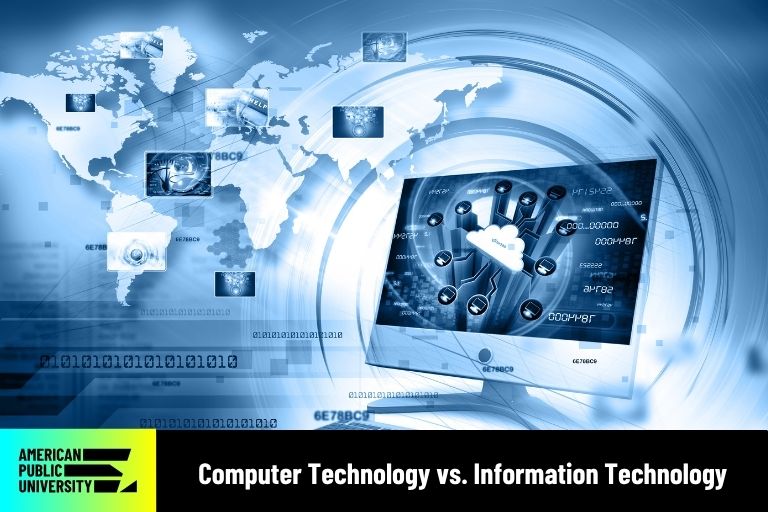08/04/2025

Understanding the Difference Between Computer Technology and Information Technology
When choosing between computer technology and information technology, it’s easy to get lost in the tech jargon. Both paths involve working with computer systems, networks, and software—but they train students for different roles in the technology ecosystem.
Prospective students can explore the difference between computer technology and information technology, understand how each degree prepares them, and identify which one aligns with their interests and career goals in the ever-evolving tech world.
What Is Computer Technology?
Computer technology degrees—often titled Computer Science, Computer Information Systems, or simply Computer Technology—focus on the foundations of computational systems. Students get to explore:
- Computer systems architecture, learning how hardware, operating systems, and software interact.
- Programming languages and software engineering, where you build everything from functional websites to mobile app prototypes.
- Database management and data structures, gaining the basics of how data is stored, organized, and retrieved.
These programs emphasize technical skills, critical thinking, and applying analytical problem-solving to real-world computing challenges. They may prepare students to design and develop software, scripts, or systems that can, for instance, run a web server, automate tasks, or prototype AI tools.
What Is Information Technology?
By contrast, an information technology degree centers on the practical use and administration of technology within business and organizational environments. Coursework often includes:
- Network security, learning how to defend an organization’s computer networks via firewalls, encryption, and ethical hacking awareness.
- System administration, maintaining local area networks (LANs) and wide area networks (WANs), ensuring systems stay up, secure, and efficient.
- Support and troubleshooting, where IT professionals become the go-to experts for solving technical issues, maintaining servers, or aiding users.
- Project management and IT operations, coordinating technology deployments that support business operations.
Graduates may pursue roles such as network administrator, information security analyst, or systems analyst. They may help organizations manage their infrastructure and safeguard data, depending on experience, credentials, and market demand.
Key Comparisons: Computer Science vs Information Technology
| Aspect | Computer Technology | Information Technology |
|---|---|---|
| Focus | Developing software, cloud computing, AI, and machine learning | Managing networks, system operation, and security |
Required Skills | Programming, algorithms, data structures, software engineering | Technical support, network setup, cybersecurity |
Learning Approach | Theory-heavy: computation, mathematics, design and computer programs analysis | Practice-heavy: setting systems live and keeping them running |
| Enjoys coding, building software, creating tools and exploring artificial intelligence | Enjoys solving hardware/software issues and securing systems |
Computer science focuses on developing innovative technical solutions, while information technology emphasizes applying them securely within organizations.
Typical Career Paths in Computer Technology and Information Technology
Computer Science Graduates
A computer science degree may prepare students for roles such as:
- Software engineers, writing code and building applications
- Web developers, creating functional websites and online platforms
- Data computer scientists, applying analytical tools to interpret and leverage data
- Cloud computing engineers or AI developers in emerging technology spaces
IT Graduates
An information technology degree may support pathways such as:
- Network administrators, overseeing company-wide connectivity
- Information security analysts, safeguarding data and systems
- IT support specialists, resolving technical issues for users
- Systems analysts or project managers, coordinating IT infrastructure projects
Both trajectories involve strong technical skills, analytical thinking, and team collaboration—developed through relevant coursework.
Emerging Trends and Industry Scope
In recent years, many tech employers have focused on:
- Cloud services—a growing focus in both fields, with students learning to build or manage cloud infrastructures using platforms like AWS or Azure.
- Cybersecurity—an essential skill in both domains, where data security and ethical safeguards meet.
- AI and Machine Learning—core in computer science, but increasingly important as IT systems integrate smart technologies.
- Systems integration and DevOps—a convergence space where code development blends with continuous operations to streamline deployments.
Staying current with evolving technologies is key. Certifications, online learning, or side projects can complement either degree path.
Exploring Computing Education Paths
Computer technology and information technology typically follow distinct academic tracks.
Students pursuing computer technology often study programming, system analysis, and database design, building strong analytical and technical foundations.
Information technology education usually emphasizes practical skills in network management, cybersecurity, and technical systems administration, preparing students to maintain and secure technology infrastructure.
These educational paths may also include project-based coursework and flexible learning formats, supporting skill development alongside real-world application.
Choosing Between Computer Technology and Information Technology
To decide which path best suits your strengths and interests, consider how you approach technology. If you enjoy coding, algorithmic thinking, or pursuing innovations like AI and software development, computer technology may be the right fit. On the other hand, if you're more interested in maintaining systems, solving hands-on technology issues, and protecting data assets, information technology could be a better match.
Both paths offer versatile foundations. It’s even possible to start in one field and incorporate skills from the other, especially in roles like systems engineering or DevOps.
How to Choose Between Computer Technology and Information Technology
When comparing computer technology vs information technology, neither is inherently “better” than the other—it all depends on what drives you.
Each discipline introduces technical and analytical concepts and promotes critical thinking and adaptability. As the tech landscape changes, familiarity with both fields may offer a wider perspective.
To dive deeper into the path of computer technology, explore "Why Study Computer Technology" to learn how this field can help shape your future in the tech industry.